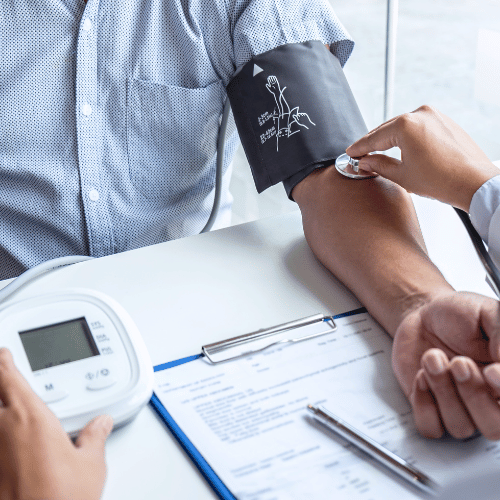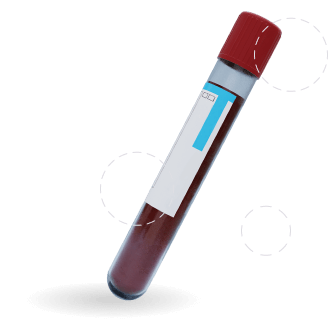
Medical Weight Loss Explained
A lot is said about medical weight loss but we are here to debunk the myths for you.
Screenings > Blood Pressure





If you have a history of high blood pressure or are concerned about your blood pressure, it is important to prioritise regular blood pressure checks. Monitoring your blood pressure at regular intervals helps to track any changes and ensures timely intervention if levels become elevated. This proactive approach not only helps in managing existing hypertension but also in preventing potential complications such as heart disease, stroke, or kidney damage that can result from prolonged high blood pressure.

Hypertension is associated with being overweight, smoking, stress, low vitamin D levels, low potassium levels, and other lifestyle factors. The primary consequence of long-term hypertension is strain on your cardiovascular system, including your heart, which increases your risk of heart disease and stroke.
Sometimes, the doctor will also recommend a full blood profile test to check your cholesterol, kidney, and liver function. Management can include lifestyle changes and medication. Subsequent regular testing may be available at a reduced fee after discussion with the clinic manager.
Regular blood pressure testing is crucial for the early detection of hypertension (high blood pressure), a condition that often presents no symptoms but can lead to serious health problems if left untreated.
By identifying and managing high blood pressure early, individuals can significantly reduce their risk of heart disease, stroke, kidney failure, and other complications associated with hypertension.


For individuals already diagnosed with hypertension, consistent and regular blood pressure testing plays a crucial role in monitoring the effectiveness of ongoing treatment strategies. Whether treatment involves implementing lifestyle modifications, taking prescribed medications, or a combination of both, regular monitoring helps healthcare providers assess how well the interventions are managing blood pressure levels over time.
This proactive approach not only ensures that treatment remains effective but also allows for timely adjustments to medication dosages or lifestyle recommendations as needed. By maintaining a routine schedule of blood pressure checks, individuals can actively participate in their health management, potentially reducing the risk of complications associated with uncontrolled hypertension such as heart disease, stroke, and kidney damage.


A blood pressure test is recommended for various reasons, including:
Blood pressure is the force of circulating blood against the walls of arteries. It’s measured in millimeters of mercury (mmHg) and recorded as two numbers: systolic (when the heart beats) and diastolic (when the heart rests between beats), like 120/80 mmHg. Normal blood pressure ensures steady blood flow to organs and tissues for oxygen and nutrients. High or low blood pressure can signal health issues and needs medical attention.

Use our online booking engine or book your test by giving us a call.
On the online booking engine select the “appointment type” you need.
You will be seen by one of our friendly doctors or trained clinicians.



Incorporated
in 1998
Experienced doctors & a professional team
Registration
not needed
Up-to-date with the latest treatments & testing
Strictly
confidential
Your medical records are kept private at all times.
Affordable private
health care
Transparent fee structure with no hidden charges
We work with experienced consultants & healthcare professionals who have received positive feedback from our patients, and with whom we have established long-term relationships.
Latest Episode
Tune in to our podcast to explore the world of healthcare and learn from distinguished special guests. We cover everything from preventative measures to cutting-edge treatments so that you can stay informed and up-to-date on health-related things.

A lot is said about medical weight loss but we are here to debunk the myths for you.

Tourist in London and need a GP? Get fast, private care for illnesses, injuries, or lost medication. No registration needed.

With NHS appointments harder to access, many people are turning to private GPs for faster, more convenient care.
Subscribe for latest updates & news


From same-day private GP and blood test appointments to visa medicals, a sexual and reproductive health clinic, and preventative health screenings, we are here to help.
Contact Us
Accepted Insurance Companies






Please note that Walk-in Clinic is a private medical centre & not an NHS service. Harley Walk-in Clinic Ltd company registration no. 07472804